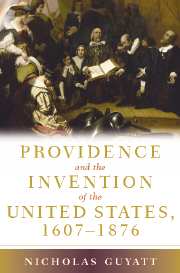Book contents
- Frontmatter
- Contents
- Acknowledgments
- Introduction
- PART ONE BRITAIN, AMERICA, AND THE EMERGENCE OF PROVIDENTIAL SEPARATISM
- 1 Providence and the Problem of England in Early America
- 2 “Empires are Mortal”: The Origins of Providential Separatism, 1756–1775
- 3 “Becoming a Nation at Once”: Providentialism and the American Revolution
- PART TWO PROVIDENCE, RACE, AND THE LIMITS OF REVOLUTION
- Index
1 - Providence and the Problem of England in Early America
Published online by Cambridge University Press: 12 December 2009
- Frontmatter
- Contents
- Acknowledgments
- Introduction
- PART ONE BRITAIN, AMERICA, AND THE EMERGENCE OF PROVIDENTIAL SEPARATISM
- 1 Providence and the Problem of England in Early America
- 2 “Empires are Mortal”: The Origins of Providential Separatism, 1756–1775
- 3 “Becoming a Nation at Once”: Providentialism and the American Revolution
- PART TWO PROVIDENCE, RACE, AND THE LIMITS OF REVOLUTION
- Index
Summary
In March 1640 John Winthrop took up his pen to write an angry letter. There were many reasons for the governor of the fledgling Massachusetts Bay plantation to be aggrieved. After ten years of constant growth, the colony was not only drawing fewer emigrants but even losing some of its prominent inhabitants to England. Winthrop's ire, however, was directed at a specific and, at first glance, unlikely target: William Fiennes, Lord Saye and Seale, one of the strongest supporters of the Puritan colonies in England. Although Fiennes was not in complete agreement with the Massachusetts settlers' religious and political decisions – he would have preferred a more aristocratic form of government, for one thing – he was a resolute defender of the Puritan settlements at a moment when King Charles I and the Anglican Church were suspicious of religious dissent in America. Fiennes had even used Winthrop's famous words – that New England was “a city upon a hill” – in a letter to an American correspondent, suggesting that he appreciated not only the political but the religious importance of the Massachusetts experiment.
In 1640, however, Winthrop discovered that Fiennes had thrown his support behind another colonizing effort. While the English settlements in New England and Virginia had achieved a modest degree of success by this date, they had hardly established themselves as the leading colonies on the vast American continent.
- Type
- Chapter
- Information
- Publisher: Cambridge University PressPrint publication year: 2007
- 1
- Cited by



